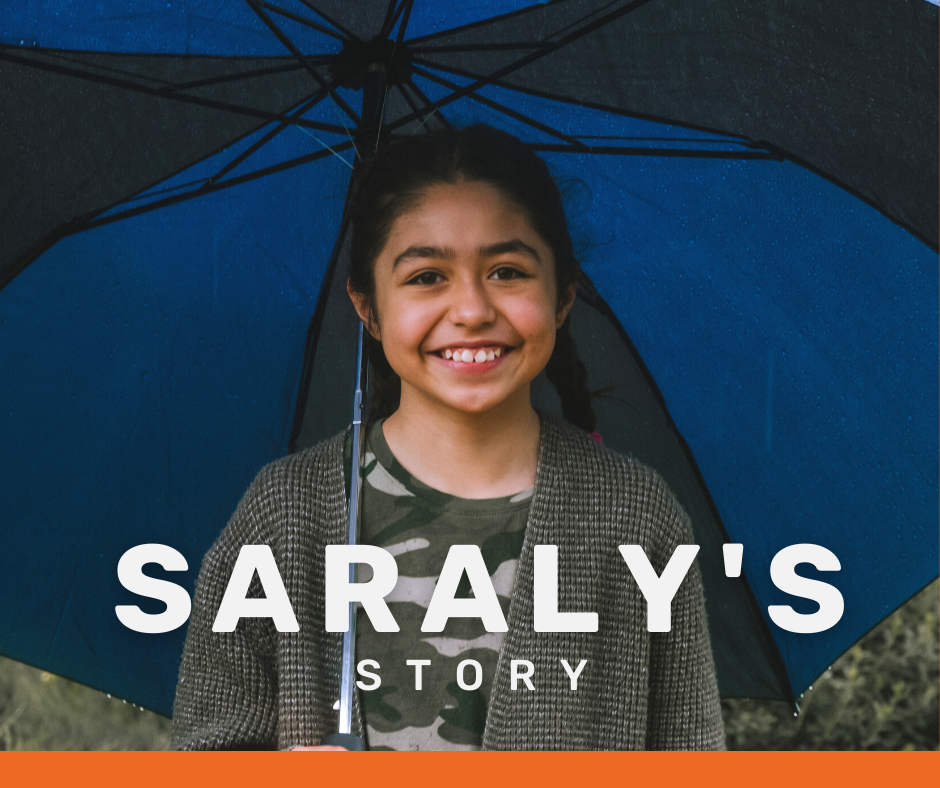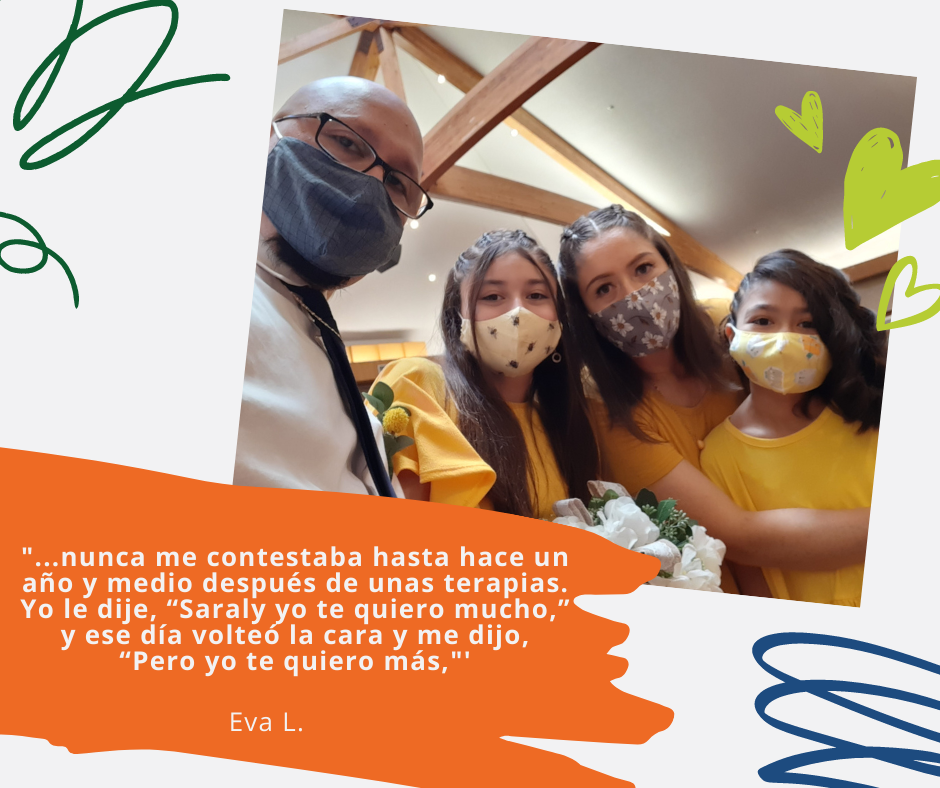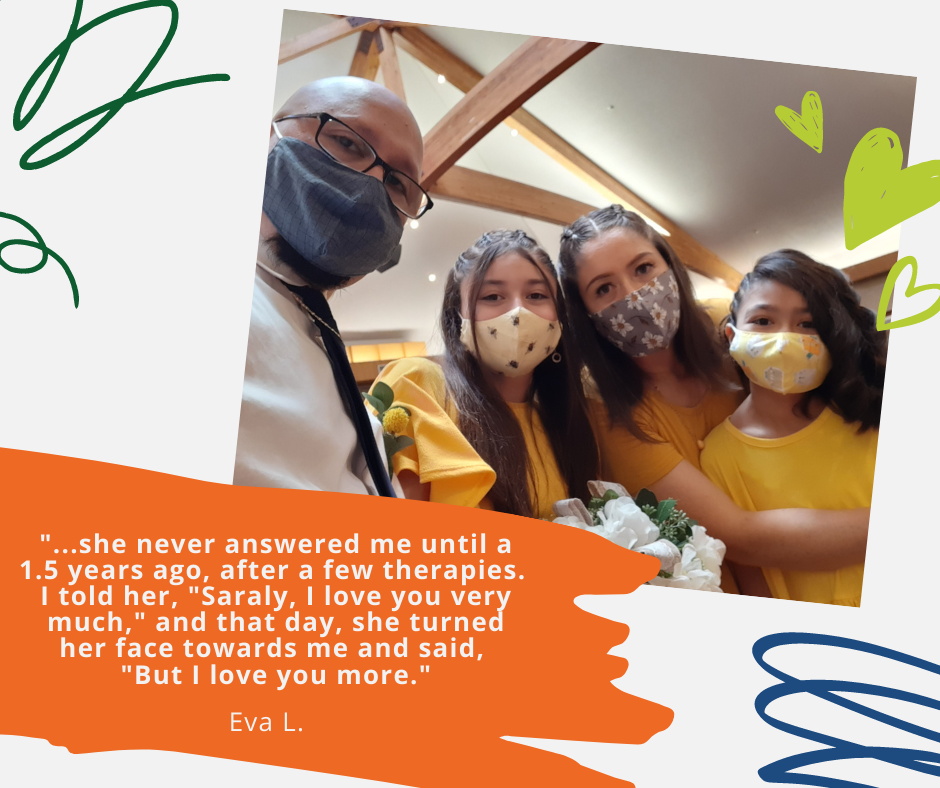¿Cómo se conectó usted Developmental Pathways? ¿Todavía recibe servicios y ayuda de ellos?
Bueno, yo les conocí a ustedes debido que cuando le dieron el primer diagnóstico a mi hija y asistí a una junta de del Grupo Vida. También, con algunos folletos en ferias de recursos que encontraba. En estos folletos me fui informando más.
¿Hay algunas memorias específicas que pueda compartir sobre las metas que su niña ha logrado con Developmental Pathways?
Entonces, todo el tiempo yo le decía a mi hija, “Saraly, yo te quiero mucho,” y yo sabía que ella me escuchaba. Pero, como madre de una hija que tiene una discapacidad y otra hija típica, pues yo le digo a mi otra hija, “Te quiero mucho,” y ella me responde. Mi madre me ha dicho, “Mira, ve los dedos de tu mano todos los dedos de tu mano son diferentes y así son los hijos.” Entonces poco a poco he aprendido, que pues sí, yo le decía, “Yo te quiero mucho,” y nunca me contestaba hasta hace un año y medio después de unas terapias. Yo le dije, “Saraly yo te quiero mucho,” y ese día volteó la cara y me dijo, “Pero yo te quiero más,” y ese día yo quería llorar y todavía me acuerdo igual. La verdad pues es muy difícil a veces solventar algunos gastos en verdad, pero digo que vale la pena todo el esfuerzo. El esfuerzo que ella hace y el esfuerzo que hacemos nosotros como familia después de escuela y llevar la a las terapias a que juegue y cosas, así ha valido la pena. Ya la vemos que ella nos contesta todo lo que le decimos, entonces, eso ha valido mucho la pena.
Como un padre cuando te dan un diagnóstico, los doctores te dicen todo lo malo que va a suceder a tu hijo. Pero nunca te van a decir todo lo bueno que te trae a tu vida. Vas por el mundo escuchando lo que te dijo el médico, pero luego tus hijos te demuestran todo lo contrario. Te dicen, “No, se equivocó. Yo soy ‘así’ y yo te quiero mucho.” Vas viendo todo su progreso, día tras día, lo tanto que ellos trabajan mucho lograr. Lo que yo tanto esperaba era que un día me dijera, “Yo también te quiero.” Cuando lo hizo era emocionante escuchar que ella siente. Ella lo sentía, pero no sabía cómo expresarlo.
¿Cuales formas de apoyo de Developmental Pathways tuvieron el impacto más grande sobre su familia?
El impacto más grande la educación de mi hija. Lo que me ayudado mucho es Developmental Pathways. El gobierno da una cierta cantidad de horas para terapias y a ustedes siempre me han ayudado en manejarlo. Yo veo el gran avance de mi hija y esto es una ayuda grande. Me siento muy contenta en verdad y muy agradecida de haberlos conocido a ustedes.Con haber conocido de Developmental Pathways, ha impactado mucho a familia.
¿En cuáles maneras, o sea, como menos estrés, en organizar?
En este año, el estrés porque nosotros estuvimos ocho semanas enfermos. Yo tuve la dicha de que Yesenia siempre estuvo atenta. Ella estuvo atenta a que todo estuviera en orden que estuviera a Saraly en sus terapias, que yo no me sintiera tan estresada. También en la ayuda de cuidado de ella también por los días que yo de plano sí, me sentía muy muy mal también. Eso también me ayudó mucho a recuperarme pronto. Entonces, yo creo que este año estuve muy bendecida porque pues no hubo tanto estrés. No todos contamos con esa ayuda.
¿Que más quisiera ver usted para su hija para en términos de programas, oportunidades, etc.?
Yo espero que ustedes sigan apoyando esos recursos que dan a los niños la oportunidad para talleres y terapias fuera de la escuela. El sistema educativo provee sola una opción de ciertas horas a la semana que le dan terapias. Educación una a uno, y estos programas de que el terapista esta con el niño fuera de la escuela, les ayuda mucho a los niños. Ustedes se preocupen por ayudar a familias enteras. Yo creo que siempre, desde que yo llegué a Developmental Pathways, fue una de las cosas que más me gustó.
Hace poco entré a ese programa de cuidado de niños y el respiro, y yo decía, “¿Cómo voy a ir y voy a dejar a mi hija, si ese es mi responsabilidad cuidarla?” Muchas familias latinas, pensamos que nadie más me la va a cuidar como yo y me preocupa mucho. Decimos, “No tengo ni aunque sea un día para dejarla 5 minutos o una hora para ir a la tienda.” Yo creo que también en esta pandemia porque me preocupa que ella tocará todo, se metiera las manitas a la boca y se me fuera a enfermar mientras compro el mandado. Pero Developmental Pathways se preocupan como uno como padre y como madre que está cuidando un niño con una discapacidad. Ellos ayudan a toda la familia y el hijo.
¿Quiere compartir algo más?
Si un padre ve las diferencias en sus hijos desde pequeños, a veces no quiere llevarlos a una evaluación temprana por miedo. Pero deben tomar esa oportunidad. Cada día que pasa es una oportunidad menos para que los niños avancé. Cuando uno no busca esa ayuda cuando son pequeños, es una menos oportunidad para que ellos puedan avanzar. Busquen ayuda también para que no se sientan solo, yo le digo no estamos solos. Somos una comunidad. Siempre hay organizaciones que nos ayuda, como Developmental Pathways también, Rocky Mountain Human Services y otras organizaciones. Uno tiene que llevar esa voz y si no pues no llega la ayuda.
Yo después de que recibí el primer diagnóstico de mi hija, empecé a ayudar el Departamento de Educación de Colorado a las juntas de PEP, Padres ayudando a Padres, es una conferencia que se llevan tres veces al año alrededor del Estado de Colorado. Les ayudo facilitar los grupos pequeñitos en español para que platiquemos los papás por lo que hemos pasado. Como madre, siempre me ha servido mucho buscar y en dentro de esa búsqueda llegué con ustedes, así que me siento agradecida y bendecida por eso.
Nos mande un correo electrónico para compartir su historia: support-communications@nmscolo.org.
No olvide visitar nuestra página de Impacto Communitario o lea más Cuentas sobre Familias para escuchar más sobre las familias increibles que apoyamos.
English Version
How did you get connected to Developmental Pathways?
I met you all when I got the first diagnosis for my daughter and attended an el Grupo Vida meeting. I had also picked up some brochures at different resource fairs and that’s how I learned more about Developmental Pathways.
Are there any specific memories you can share about the goals your child has achieved with Developmental Pathways?
So, I always tell my daughter, “Saraly, I love you very much,” and I knew she was always listening to me. Still, as the mother of a daughter who has a disability and another daughter who is atypical, I say to my other daughter, “I love you very much,” and she responds. My mother told me, “Look, see the fingers of your hand. All your fingers are different, and so are children.” So little by little, I have learned that’s true. I told her, “I love you very much,” and she never answered me until a year and a half ago, after a few therapies. I told her, “Saraly, I love you very much,” and that day, she turned her face towards me and said, “But I love you more.” That day I wanted to cry, and I still remember everything. The truth is that it is sometimes tough to pay for some expenses, but I say it’s worth all the effort. The effort she makes and the effort we as a family make after school taking her to the therapies to play and things have all been worth it. Now she answers everything we say, so it has been so worth it.
As a parent, when you get a diagnosis, doctors tell you everything wrong that will happen to your child. But, they never tell you the good they bring to your life. You go into the world listening to what the doctor told you, but then your children show you the opposite. They say to you, “No, the doctors were wrong. I’m ‘this way,’ and I love you” You see all their progress, day to day, just how hard they work to succeed. What I hoped most was that one day she would tell me, “I love you too.” When she did, it was exciting to hear she feels the same as me. She thought it, but she didn’t know how to express it.
What forms of support from Developmental Pathways have had the most significant impact on your family?
The biggest impact has been my daughter’s education. Developmental Pathways helped me a lot. The government gives a certain number of hours for therapies, and you all have always helped me manage that. I can see my daughter’s growth, and it’s such a tremendous relief. I feel so happy and grateful to have met you all. Being acquainted with Developmental Pathways has greatly impacted my family.
What else would you like to see for your daughter in terms of programs, opportunities, etc.?
I hope you continue to support resources that give children opportunities for workshops and therapy outside of school. The educational system can only provide therapies for certain hours of the week. One-on-one education and programs where the therapist is with the child outside of school help the children tremendously. You all care about helping entire families. This is one of the things that I liked about Developmental Pathways.
It was not long ago that I began EI and the respite program and said, “How am I going to leave my daughter if it’s my responsibility to take care of her?” Many Latino families think, “No one else will take care of my child like I do,” which makes us stress. There’s not a day when I can leave her for 5 minutes or an hour to go to the store. Even more so in this pandemic because I worry that she’ll touch everything, put her hands in her mouth, and get sick while I’m at the store. But Developmental Pathways understands you as a parent who cares for your child with a disability. They help the whole family and the child.
In what ways has Developmental Pathways, such as less stress, in organizing?
During this year, stress because we got sick for eight weeks. I had the privilege of Yesenia’s help. She was always attentive. She made sure that everything was in order, that Saraly was in her therapies and that I didn’t feel so stressed. Also, her support during the days I felt flat-out awful, all of it helped me to recover faster. I think this year I was very blessed because there wasn’t as much stress. Not everyone has that kind of help.
Do you want to share anything else?
If parents notice differences in their children at a young age, sometimes they fear taking them to an early evaluation. But they should take that opportunity. Every day that passes is one less opportunity for their child to advance. When you do not seek help when they are young, it is less opportunity for them to move forward. Seek help, so you also do not feel alone; we are not alone. We are a community. There are always organizations that help us, like Developmental Pathways, Rocky Mountain Human Services, and other organizations. You have to let your voice be heard, and if not, then help does not come.
After receiving my daughter’s first diagnosis, I began to help the Colorado Department of Education in PEP meetings. Parents Helping Parents (PEP) is a conference that takes place three times a year around Colorado. I help them facilitate the small groups in Spanish so that parents can talk about what we have been through. As a mother, searching has always helped me a lot, and within that search, I found you all, so I feel grateful and blessed for that.
Share your story with us at support-communications@nmscolo.org.
Be sure to visit our Community Impact page, or read more Family Stories to hear more about the other incredible families we have the privilege to support.



